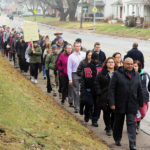(Editor’s note: The following extract from an editorial in the June 30 issue of “The Hill” website, was written by Cardinal Daniel DiNardo, Archbishop Jose Gomez and Bishop Joe Vasquez of the U.S. Conference of Catholic Bishops. To read the full editorial, go to: https://thehill.com/opinion/immigration/451033-as-a-nation-we-must-honor-the-humanity-and-basic-needs-of-migrants)
We mourn the deaths of 23-month-old Angie Valeria and her father, Oscar Martinez, who died (June 24) while fleeing El Salvador in search of safety in the United States. This young family embarked on a journey of over 1,400 miles, through some of the most dangerous parts of the world, which ended with a father paying the ultimate price — his life — to keep his daughter from harm’s way. Angie was still scared after she was left safely on the river bank and she jumped back in the water to be with her dad, her security.
Unfortunately, the deaths of Angie and her father are not the first we have seen during this ongoing humanitarian crisis. In December, we saw the face of Jakelin Caal Maquin, a 7-year-old from Guatemala who died from sepsis while in custody of the Border Patrol. Countless others, all precious children of God, do not make it to the border, finding their final resting place somewhere along a journey that began with hope but quickly turned into despair.
These deaths are occurring because the United States is closing off access to asylum protection through policies and enforcement that send the clear and strong signal that you are not welcome.
As a nation, we must learn the harsh lessons from our past about closing doors to U.S. asylum. One of the more unfortunate chapters of our great nation’s history was our experience during World War II, when we turned away the S.S. St. Louis, a ship carrying nearly 1,000 Jewish refugees fleeing persecution in Nazi Germany. In the aftermath of that experience and that war, the United States helped lead the world in establishing international protocols to ensure that refugees fleeing persecution in their country of nationality or habitual residence would receive protection when they present themselves at another country’s borders.
The United States went on to enshrine those protocols into U.S. refugee and asylum law, creating a body of laws that has been embraced over the ensuing decades on a bipartisan basis by presidents and Congress alike.
We all know the dangers associated with migrating from the Northern Triangle countries of Honduras, Guatemala, and El Salvador. The situation is so dire in these countries due to gang violence, corrupt governments, and poverty that people are willing to risk their lives to walk through Central America and Mexico in the hope for asylum in the United States.
For the second straight summer, asylum seekers, most of them children and families, are caught in the middle of a stalemated political battle as they endure the brunt of life-altering scenarios and poor conditions. Last year, as part of the zero-tolerance policy implemented to slow the migration of people to our country and deny them the right to seek the protection of asylum, we saw heartbreaking scenes of children being ripped away from their parents.
This year, many are forced to remain in Mexico as they risk dangers on the border to await their uncertain future. Those who are able to cross the border are put in facilities with reported conditions that are substandard for a facility run by the United States Government.
It is imperative that the administration and Congress come up with a solution to these tragic realities and pass a comprehensive immigration reform plan that will include immediate humanitarian relief.
One of God’s greatest commandments is to “love thy neighbor as thyself.” Following this commandment, we must remain a country that provides refuge for children and families fleeing violence and persecution or we have lost our core values as a nation. Perhaps the memory of our turning away of asylum seekers on the S.S. St. Louis and the image of Angie and Oscar’s lifeless bodies, face down on the river bank, will motivate Congress and the administration to work together to reach a rapid and just solution to this crisis that does not involve eviscerating U.S. refugee and asylum law.
(Cardinal DiNardo is president of the U.S. Conference of Catholic Bishops. Archbishop Gomez is vice president of the USCCB and Bishop Vásquez chairs the USCCB Committee on Migration.)











